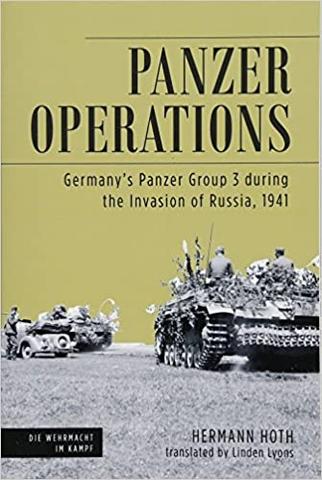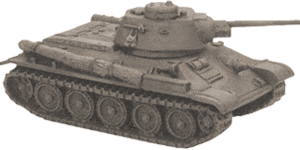Panzer Operations

Astute readers may have noticed that to date I have shied away from reviewing any of the books written by German officers who fought in the Second World War. So why this book? I'll get to that, my thoughts on the author, and a word of caution for readers, but first let's discuss the actual book.
Originally penned in 1956 this is the English language edition, and a good one at that. The translation by Linden Lyons is excellent. His work fully holds up well in comparison to other notable military history translators working for the English language market (such as Stuart Britton - one of my favorites in making Russian publications available here in the U.S.).
The author, Hermann Hoth, is most notable for being the commander of Germany's Panzer Group 3 during the 1941 German invasion of the Soviet Union (Operation Barbarossa). There is no question Hoth had a sound mind for conducting armored warfare at the operational level. For that reason I welcomed Hoth's choice to begin this publication by offering his opinions on what were then some of the most pressing current issues in military operations. This includes a prominent discussion of the use of armor during tactical nuclear warfare, which I enjoyed. His commentary on these issues reflected well the debate over the usage of such weapons in war during the 1950's. At the same time it reminds the reader of the vast potential for immense destruction held in such weapons.
From there, Hoth jumps into Barbarossa, including a detailed discussion of the planning, and his panzer group's role in the campaign. This is the bulk of the book. Hoth's analysis is welcomed in terms of providing readers a better understanding of the isues facing the German General Staff in constructing a viable invasion plan as well as the role of Prussian/German military history in influencing the thinking of these officers. Hoth is not afraid to point out mistakes, though Hoth does what really all of his peers would do after the war - that being to regularly deflect potential criticisms of their mistakes in prosecuting the war and its disastrous outcome for Germany onto Hitler alone. This was the standard play book for German military officers writing after the war and as part of a coordinated plan to present the German military leadership in the best possible light. Though Hoth finishes the book with offering up lessons for the usage of armor in modern operations it is his analysis of Barbarossa that is the book's strength but also it's weakness.
On the positive side, Hoth critically breaks down the plan for Barbarossa, what kind of considerations had to be taken into account, and the fundemental issues that were never really solved in terms of drilling down Barbarossa's disparate goals into a functional and targeted plan of operations. That and the narrative he provides on Panzer Group 3's operations during Barbarossa are why I think this book should be read (Hoth's insight into the nuts and bolts of managing large armored forces on the battlefield are well worth examining). That said, the problem is that I do not think this book should be read by anyone without an already thorough understanding of the war fought between Nazi Germany and the Soviet Union. An underinformed reader can easily be misled into believing that Hoth and his fellow officers, had they been listened to, would have won the war for Germany. This simply is not true.
In fact, many of Barbarossa's biggest problems as a plan came from within the German army. The Chief of the German Army's General Staff, Franz Halder, made numerous mistakes (among others) above and beyond what would be considered acceptable. Yet Hoth essentially gives him a free pass. Again, this is not uncommon, whether reading the memoirs of Guderian, Manstein, Mellinthin, or any of the other dozens of such post-war books penned by leading German generals of the Second World War the message is consistent - it was not our fault and we are not war criminals. This leads me to another strength of this English language translation.
Most of the English language translations of the German General's varied post-war works are typically just that - direct translations. This particular series of books that Hoth's new edition is a part of (Die Wermacht Im Kampf) has done is provide some badly needed context. In a closing Epilogue Linden Lyons briefly and clearly explains to the reader that Hoth was a dedicated Nazi and anti-semite. This makes it much harder for a reader to walk away from this book without concluding that Hoth was both a competent war time leader, but also a war criminal with truly repugnant views. This is important. When Manstein, Guderian, and many of their peer's memoirs were translated into English decades ago their self-serving claims of innocence even as the larger Nazi project of extermination unfolded around them were allowed to stand. Such editorial decisions played a key role in allowing American readers to dangerously distance these men from the true nature of the regime they willingly and enthusiastically served.
This translation's only true fault is in not providing the same contextual treatment to Hoth's repeated insinuations within the text that the Wehrmacht's military failings were mostly Hitler's fault alone. Thus, when Hoth discusses the July-August 1941 struggle between Hitler and his generals as to the direction of Barbarossa (the generals favored striking Moscow immediately, Hitler wanted to clean up the flanks first) there is no real corrective to Hoth's clearly biased opinions. This is a shame. One of the reasons I have chosen to give this book a qualified recommendation is that Hoth is not only someone who can write clearly about operational miltiary matters (with the experience to match), but also that when he chooses to do it he can be intellectually honest. For instance, he has no problem casting the German army's decision to maintain Operation Typhoon (Army Group Center's final drive toward Moscow) past the end of October as a mistake.
Overall, if you are an advanced level historical enthusiast of the 1941-1945 German-Soviet War I think you will have much to enjoy and even learn from this book. In addition, your pre-existing knowledge will grant you the ability to recognize when you are stepping in something else that Hoth is laying down. If you are not an advanced student of these topics I appreciate the publisher's decision to have Lyons write his excellent and much needed corrective to clarify Hoth's record as to war crimes. Nevertheless, I wish there would hae been just a bit more about the role Hoth played in his post-war work along with his former comrades toward casting blame for their failings on the very easy targets of Hitler and his equally vile political cronies. Even a few paragraphs in the Epilogue devoted to the larger decision-making blunders of the German army's leadership that played just as big a role in the Third Reich's ultimate defeat would have been very much welcomed. Had that been included I would have no problem recommending this book to more casual readers of these important events and not just those of you with a more thorough understanding of the war.



Post new comment